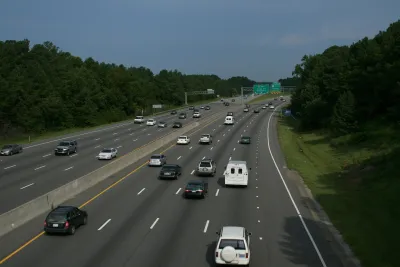Behavioral science is informing the city’s efforts to change the way people commute.

Durham, North Carolina, is one of nine cities that was awarded a $1 million grant through Bloomberg Philanthropies’ Mayors Challenge. The city plans to use the funds to continue developing innovative mobility strategies similar to ones tested earlier this year aimed at getting drivers to use alternative modes of transportation.
The six-month test run provided 1,500 commuters with incentives that acted as behavioral “nudges” to encourage them to travel other ways. In one case, people were sent emails showing biking, transit, and walking routes, reports Laura Bliss:
The emails also included trip time comparisons and listed the potential benefits of alternatives to solo driving, including the weight loss potential, the savings in gas money, and the time commuters could reclaim from the city’s infamous traffic. “Driving downtown is so 2017,” the maps said.
The other program involved a weekly lottery with a cash prize for city employees who used the bus. Both strategies affected behavior by encouraging people to move beyond intention to actual actions—in this case, ones that would benefit society.
The goal of this first round of incentives was to reduce solo driving trips by 5 percent. The outcome was even better than expected: the percentage of drivers commuting alone was 12 to 16 percent lower among participants who received the incentives compared to those who did not.
The city plans to use the $1 million to take the programs citywide in an effort to reduce single-occupancy vehicle commuting by 5 percent among Durham’s entire population.
“The idea of ‘nudging’ as public policy doesn’t sit well with everybody; critics have pointed out that it creates the potential for governments to manipulate citizens, and deprive them of their capacity to make their own decisions,” says Bliss.
But Durham city leaders argue that the purpose of the programs is not to hinder people’s decision-making abilities. Rather, they seek to offer as many viable options to commuters as possible.
FULL STORY: Durham’s Plan to ‘Nudge’ Drivers Out of Cars

Analysis: Cybertruck Fatality Rate Far Exceeds That of Ford Pinto
The Tesla Cybertruck was recalled seven times last year.

National Parks Layoffs Will Cause Communities to Lose Billions
Thousands of essential park workers were laid off this week, just before the busy spring break season.

Retro-silient?: America’s First “Eco-burb,” The Woodlands Turns 50
A master-planned community north of Houston offers lessons on green infrastructure and resilient design, but falls short of its founder’s lofty affordability and walkability goals.

Test News Post 1
This is a summary

Analysis: Cybertruck Fatality Rate Far Exceeds That of Ford Pinto
The Tesla Cybertruck was recalled seven times last year.

Test News Headline 46
Test for the image on the front page.
Urban Design for Planners 1: Software Tools
This six-course series explores essential urban design concepts using open source software and equips planners with the tools they need to participate fully in the urban design process.
Planning for Universal Design
Learn the tools for implementing Universal Design in planning regulations.
EMC Planning Group, Inc.
Planetizen
Planetizen
Mpact (formerly Rail~Volution)
Great Falls Development Authority, Inc.
HUDs Office of Policy Development and Research
NYU Wagner Graduate School of Public Service


























